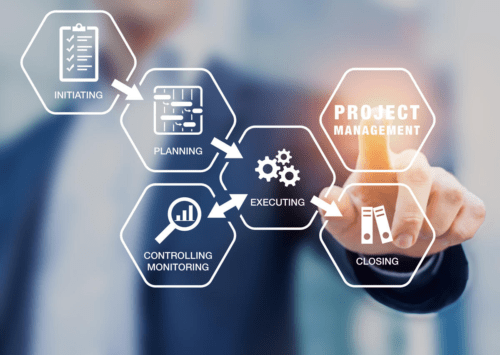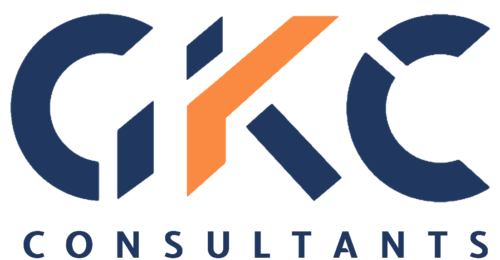WHAT IS PROJECT MANAGEMENT CONSULTING?
 Project Management Consulting (PMC) can describe a range of services starting with applying project management expertise to one real project, exposing your project team to the most effective practices so they can take the reins on future projects. In this mode of consulting, practices such as project chartering, risk management, or Earned Value Management (EVM) might be utilized to get your project on track and keep it there. Consulting can also include helping your organization establish a customized project management framework or project management office (PMO) or providing an outsourced version of all of this work so you don’t have to worry about your projects
Project Management Consulting (PMC) can describe a range of services starting with applying project management expertise to one real project, exposing your project team to the most effective practices so they can take the reins on future projects. In this mode of consulting, practices such as project chartering, risk management, or Earned Value Management (EVM) might be utilized to get your project on track and keep it there. Consulting can also include helping your organization establish a customized project management framework or project management office (PMO) or providing an outsourced version of all of this work so you don’t have to worry about your projects
WHAT DO WE PROVIDE?
Turn your organization’s project management capability into a competitive advantage.
 GKC guarantees your activities are overseen effectively all through the whole undertaking life cycle, decreasing the danger of task expenses and timetable invades.
GKC guarantees your activities are overseen effectively all through the whole undertaking life cycle, decreasing the danger of task expenses and timetable invades.
At GKC we perceive that associations can be at various degrees of undertaking the Client’s development. In that capacity, we endeavour to comprehend your necessities, to give answers for your current requirements, and all the more critically, construct ventures for what’s to come in future.
PROJECT CONTROL
Project controls are processes for gathering and analysing project data to keep costs and schedules on track.
The functions of project controls include, initiating, planning, monitoring, and controlling, communicating, and closing out project costs and schedules.
Project controls are all-encompassing for project definition, planning, execution, and completion, assisting in the entire lifecycle of your project. As we said before, the use of controls will vary according to individual project demands, but project controls address, organize, and of course control the following aspects of your project management system:
- Developing your project strategy; defining methods that will enhance the future PM software use and project outcomes
- Development, updates, and maintenance scheduling for the PM software
- Estimating project costs; engineering and controlling costs and assessing project value
- Managing risks; assessing and analysing project risks, and cataloguing past risks and how to avoid future risks
- Earned schedule and earned value management, including both work and organizational breakdown structures
- Controlling project documentation
- Diagnosing project scheduling and costs with forensic assessment procedures
- Oversight and quality assessment of supplied materials .Comprehensive integration of the elements of control and other domains of project management
WHAT ROLE DO WE PLAY?
 Determining the scope of the project; explaining and communicating every aspect of the project to all members of the team.
Determining the scope of the project; explaining and communicating every aspect of the project to all members of the team.
- Team structure and assigning tasks; determining who is best suited for each required task, how many members are assigned to each team, and planning on how to monitor progress.
- Predetermined risk factors: knowing which risks are worth taking, and which are guaranteed to sabotage project success. Setting a risk management plan to mitigate risks before they can become real project threats will save you a boundless amount of pain when risks are managed,
- Adaptability contingencies: both internal and external factors can demand that a project must change its course. Plan for the unexpected, but possible factors that would demand change to your project process and set contingencies to adapt to change.
- Monitoring of project status; set a schedule and determine a method (i.e. whether in person regular meetings, or the submission of written reports) for monitoring how well or poorly your project is progressing. Also, if the project is moving along ahead of schedule, investigate and find what is facilitating the rapid progress. Apply the factors to future projects. The same rings true in the opposite scenario, when your status is behind schedule. You will then know what to monitor for and avoid in future projects, saving valued time and money.
- Deadlines and budgeting; set in place a plan for establishing the initial project costs, keeping track of changes to the budget by regular communication with the accounting department, and ensuring that deadlines are met. Also, develop a contingency plan for if and when a deadline is not met, how to avoid future deadline failures. Analysis/evaluation; set a system for evaluating and analysing how well each element of the project planning and execution is contributing to the overall project success within the scope of the project. Is anything missing? Do you need to allocate more resources or reassign personnel? A system should be in place to solve questions (and all others) like these during both execution and planning.
A Project is complete, when the project starts working for you rather than you working for it!
